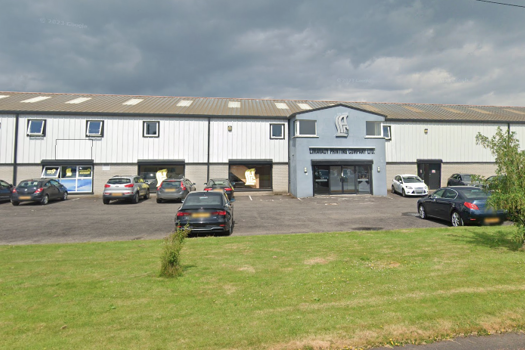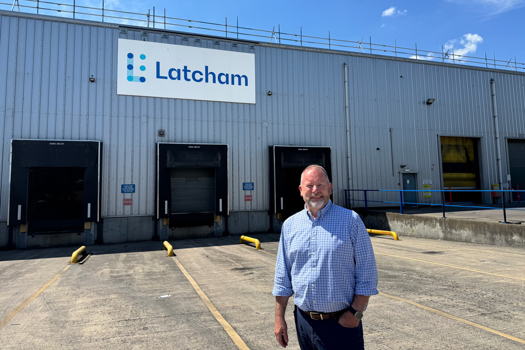The work of a high-volume printer looking to optimise its productivity is never done. Take the installation of a brand new state-of-the-art Komori LSX Press at Benson Group’s Gateshead plant in September 2009; you’d think optimal production was surely in the bag with such a purchase. However, when one process is streamlined, it often creates a bottleneck elsewhere, and for the Gateshead printer, this happened in the finishing department.
"Obviously when you increase the front-end you can then create bottlenecks downfield," says Andrew Pybus, general manager for Benson Group’s North East plants. "And then when you’ve dealt with those issues, you’ll probably go round in circles – the next investment will be another new press and then we’ll have to start again."
Expansion has been the story of the plant certainly since it was established in 1977, with its premises growing from 230m2 then to 11,000m2 now. Acquired by Benson Group in 2006, the plant joined Tyneside-based Print Design & Graphics and Benson’s headquarters in Leicestershire to complete Benson’s portfolio of plants specialising in food packaging. The plant now contributes to making the Benson Group one of the UK’s leading privately owned printed carton suppliers.
First steps
In April, Benson took the first step in eradicating the bottleneck around the post-press processes with the installation of a Masterfold 75 A1 version of the Bobst folder-gluer – an obvious place to start as the folder-gluers at Gateshead were some of the oldest in the group. This was completed with a Bobst Easyfeeder GT automatic feeder and a Cartonpack GT automatic carton packer for a more automated, high-speed operation.
Replacing an old Bobst 103 die-cutter with the Expertcut was the next logical step. So too, says Pybus, was going once again for a Bobst model. "Bobst has got such a brand and such a name in the industry; every other cutting machine we’ve got here is a Bobst machine so this was a no-brainer really," he says.
Benson didn’t feel the need to trial any other models when they installed the machine, both at Gateshead and at the group’s Leicestershire plant earlier this year. Pybus says that so far this hasn’t proved to be an oversight.
"The benefits have been fantastic," he says. "The Expertcut has increased our running speeds dramatically, to the extent that we no longer have to work weekends."
Although the Gateshead plant has for some years enjoyed the benefits of die-cutting machines that deliver pre-separated blanks – seeing this as a standard must-have feature rather than an exciting optional extra – Pybus still recognises the huge role that having a blank separating die-cutter plays in optimising productivity. Such die-cutters can save time and labour by stripping away the excess material once a blank has been cut. Instead of delivering a sheet of blanks held together by ‘nicks’ that have to be separated by hand, the machine sucks the waste into a compactor, and delivers blanks that are ready to go straight to the gluing machines.
But the die-cutter’s efficiency is not solely down to this mechanism, reports Pybus, who attributes this chiefly to the machine having a continuous feed tray, unlike its predecessor, which had to be stopped every time a new pallet was loaded. The machine’s overall efficiency is simply superior to its predecessor, says Pybus. "Even if we throw problematic boards at it, it still delivers 9,000 sheets per hour," he says. "It performs better than we’d anticipated even with thicker board, board with variation on it or board that’s quickly off the press and straight into the cutting."
This high overall productivity has, inline with Bobst’s intentions for the machine, allowed the Gateshead plant to also produce non-blanked jobs on the Expertcut and still enjoy much higher levels of productivity than on older, non-blanking machines they’ve used.
"We don’t run many jobs that are non-blanked," says Pybus. "It’ll usually be a one-off job at Christmas or a small job of around 5,000 to 7,000 sheets that’s only run twice a year. But it’s really handy to have the capability to run jobs that are too short to justify the expense of tooling the cutters, without compromising on speed."
Another feature that Pybus has been particularly impressed by is the Expertcut’s dynamic register system. Whereas some cutters register the die-cutting to the edge of the board, the Expertcut’s Power Register II system registers it to the print on the board, making it ideal for jobs where there is embossing or a critical print design and for converting high-quality print or litho-laminated board.
The Power Register is also designed to be more tolerant of variations in the verticality of the pile of sheets delivered from the presses, another feature the machine consistently delivers on, reports Pybus.
"The leeway on it is about 13mm and it stops all of the moans that you get in this department that the board has warped or bent," says Pybus. "All of those excuses have gone, there’s no complaints whatsoever," he adds, saying the machine has been unanimously welcomed by staff who only wish it had been installed sooner.
Illuminating issue
While the cutter has exceeded the company’s expectations, the installation of such a large machine inevitably met with a few hitches. Preparing a concrete floor and drilling carefully positioned holes into this went reasonably smoothly, Pybus reports, but an oversight on the part of Bobst emerged when the Expertcut arrived.
"We discovered that the light area where you check your sheets didn’t come with a light bulb," says Pybus. "It’s quite funny really that we had this beautiful looking, modern piece of machinery that’s so finely tuned in every way, but then production is postponed because of something as simple as a missing light bulb."
The problem was quickly resolved by Bobst, Pybus reports. So too was a collapsed bearing in the feed area of the die-cutter early on in the machine’s life, impressing the company with the overall level of support provided by Bobst.
"They repaired the bearing very quickly," says Pybus. "Production was only halted for about three hours."
Die-cutters the company has previously used have experienced reliability issues, but Pybus says that, in the main, the Bobst has performed well, considering the high demands the company places upon it.
Pybus has been particularly impressed by the amount and quality of the training offered by Bobst. "They spent two weeks training our guys on the Expertcut," he says. "They do an assessment of what skill level the operators currently have and then they’ll fill in the gaps. They’re doing a lot of in-house training for us at the moment in gluing, cutting and creasing – they definitely understand that skilled employees are a company’s most valuable asset."
Pybus says he would have no hesitations in recommending the machine to other companies. "I think a small company would find it hard to justify the cost of the machine we have unless they were on a very steep growth path, but for a high-volume printer like us it’s ideal," he says. "It’s given us greater flexibility and that’s really important as we like to sell ourselves on being able to turn things around quickly at short notice."
Bobst points out that the Benson machine is indeed suited to higher volumes, but the manufacturer points out that there are many other configurations for the Expertcut, so it can be tailored to fit numerous company sizes and run volumes.
Overall, Pybus says he is very satisfied with his new machine, not least because, to coin a phrase, it does exactly what it says on the tin.
"The Expertcut is a success in the most simple but important way," he says. "It does exactly what it promises to do."
SPECIFICATIONS
Max speed 9,000sph
Max sheet size 1,060x760 mm
Min sheet size 400x350mm
Machine footprint 6.3x5.4m
Price from £650,000
Contact Bobst 01527 519700 www.bobstgroup.com
COMPANY PROFILE
Integrated Packaging in Gateshead was established in 1977 and was acquired by Benson Group in 2006. A year later, Benson acquired another Newcastle packaging printer, Print Design & Graphics. Food manufacturers are the main customers for Benson’s Leicestershire base and two North East printers, with the Gateshead site attracting a core market of high-volume sleeves and straight-line boxes for food packaging, particularly chilled food packaging. Benson Group is one of the UK’s largest privately owned carton printers, and creates packaging for many well-known companies, such as Reckitt Benkiser, Greencore, Samworth Brothers, and the UK’s leading supermarket chains. Two of Gateshead’s key customers include Bakkavor and Northern Foods.
Why I bought it…
Installing the Expertcut was one of a series of key investments made this year by Benson Gateshead to avoid bottlenecks at the gluing and cutting stages. By modernising this equipment, the factory aims to make this stage as efficient as the factory’s print operation.
How it has performed…
General manager for Benson Group’s North East plants Andrew Pybus says the Expertcut has improved the productivity of the plant even more radically than expected. He says that the Expercut cuts around 5,000 to 6,000 sheets per hour more than its predecessor, a Bobst 103.
Me & my... Bobst Expertcut 106PER

When the installation of a new press meant that the finishing department was having trouble keeping up, Benson knew who to call









